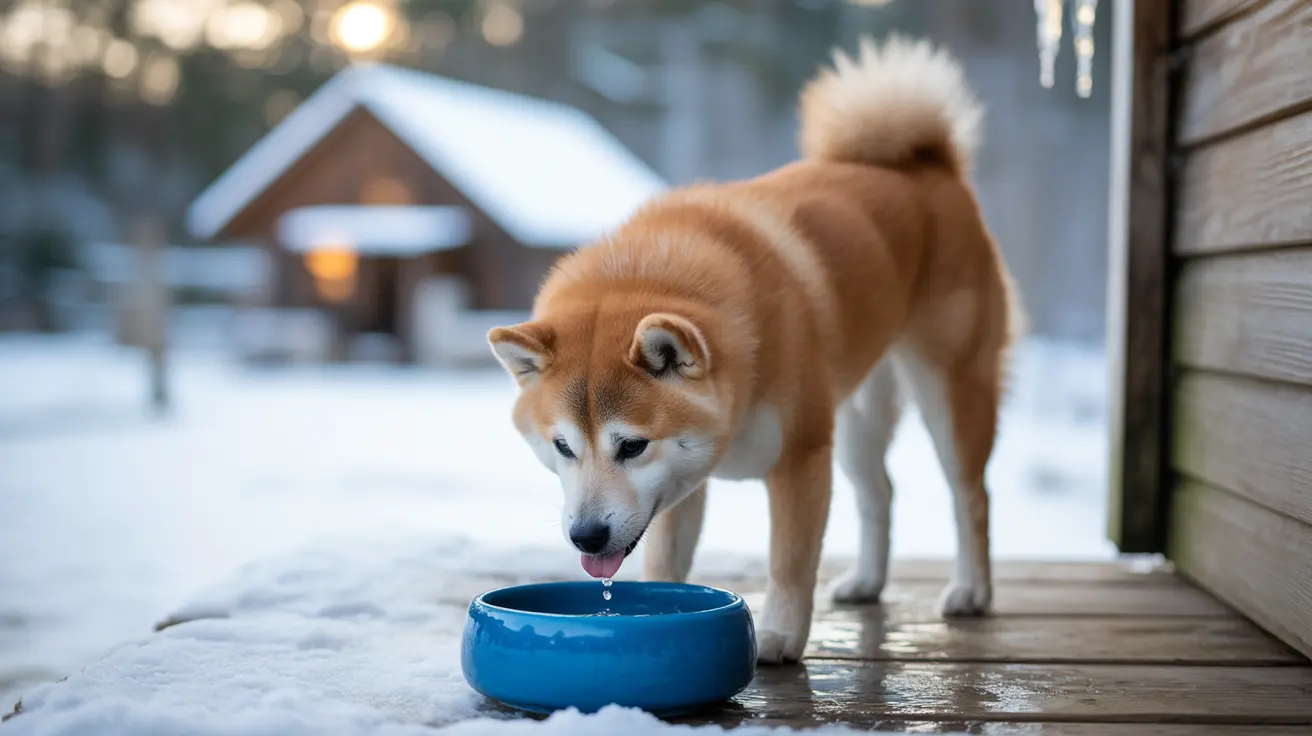How Winter Environmental Factors Affect Your Dog's Thirst
The winter environment creates unique conditions that can significantly impact your dog's hydration needs:
Indoor Heating and Humidity
Modern heating systems, while keeping us warm, dramatically reduce indoor humidity levels. This dry air increases moisture loss through your dog's breathing and skin, naturally leading to increased thirst. Many dogs spend more time indoors during winter, exposing them to these dehydrating conditions for longer periods.
Cold Air Effects
Cold outdoor air naturally contains less moisture than warm air. When your dog breathes in this dry winter air and exhales warm, moist air, they lose more body moisture than usual. This process, known as respiratory water loss, occurs even more rapidly during winter exercise or play.
Physical and Behavioral Changes in Winter
Activity Level Impact
Winter often brings changes to your dog's routine and activity levels. Despite being less active, dogs may actually need more water due to:
- Increased energy expenditure for staying warm
- More time spent in dry indoor environments
- Changes in diet or feeding patterns
Dietary Considerations
Winter dietary changes can affect water consumption. Many dogs receive:
- More dry food and fewer fresh or wet food options
- Additional treats during holiday seasons
- Different food portions to account for changed activity levels
Signs of Healthy vs. Concerning Water Consumption
Normal Winter Increases
Healthy increases in water consumption during winter typically:
- Correspond with environmental changes
- Remain relatively consistent throughout the day
- Don't accompany other concerning symptoms
Red Flags to Watch For
Contact your veterinarian if you notice:
- Sudden, dramatic increases in water consumption
- Excessive urination
- Lethargy or behavior changes
- Apparent difficulty staying hydrated despite increased intake
Tips for Maintaining Proper Hydration in Winter
Help your dog stay properly hydrated during winter months by:
- Providing multiple water stations throughout your home
- Monitoring water bowl levels more frequently
- Using pet fountains to encourage drinking
- Adding moisture to dry food when appropriate
- Maintaining consistent room humidity with humidifiers
Frequently Asked Questions
Why is my dog drinking more water than usual during the winter months?
Dogs often drink more water in winter due to dry indoor heating, increased respiratory water loss in cold air, and the body's increased energy needs for maintaining temperature. This is typically normal seasonal behavior.
How does dry indoor air and heating in winter affect my dog's thirst and hydration?
Indoor heating systems reduce air humidity, causing increased moisture loss through breathing and skin. This naturally leads to greater thirst as your dog's body works to maintain proper hydration levels.
What signs indicate winter dehydration in dogs even if they don't seem thirsty?
Look for signs such as dry or sticky gums, reduced skin elasticity, sunken eyes, lethargy, and decreased appetite. Winter dehydration can be subtle but requires attention.
When should I be concerned that my dog's increased winter water intake is a health issue?
Be concerned if water consumption suddenly increases dramatically, especially if accompanied by excessive urination, changes in appetite, lethargy, or other unusual behaviors. These could indicate underlying health issues requiring veterinary attention.
What can I do to help keep my dog properly hydrated during cold, dry winter conditions?
Maintain multiple fresh water sources, consider using a humidifier, monitor water intake, add moisture to dry food when appropriate, and ensure water bowls never freeze. Regular monitoring and consistent access to fresh water are essential.
Conclusion
While increased water consumption during winter is often normal, understanding the reasons behind it and knowing when to be concerned can help ensure your dog's health and comfort during the cold season. Keep monitoring your pet's water intake, maintain proper environmental conditions, and consult your veterinarian if you notice any concerning changes in drinking habits or behavior.






